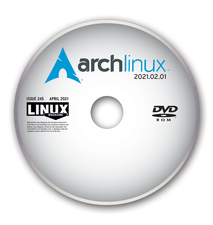On the DVD
On the DVD

Arch Linux 2021.02.01 and MX Linux mx-19.3
Arch Linux (64-bit)
Begun in 2002, Arch Linux is one of the most respected distributions available. Although less well-known than Ubuntu or Fedora, Arch has a reputation for the adherence to its core values of remaining simple and lightweight. However, what Arch means by those terms may not be what others assume.
By simple, Arch means that its packages are as close to those of upstream developers as possible. The only modifications are those accepted by the upstream developers. When Arch does patch a package, the patch is usually a bug fix, which is removed when a newer upstream version of the package is available. Similarly, by lightweight, Arch means that it installs a bare-bones system, without the usual curated selection of packages that developers assume that users might want.
In keeping with both these values, Arch does not install in 10 minutes using average defaults. An Arch installation is highly individualistic, with users expected to choose their system configurations for themselves. For this reason, even if you have some experience installing Linux, you should install Arch Linux with its installation guide open by your side (https://wiki.archlinux.org/index.php/Installation_guide).
[...]
Buy this article as PDF
(incl. VAT)
Buy Linux Magazine
Subscribe to our Linux Newsletters
Find Linux and Open Source Jobs
Subscribe to our ADMIN Newsletters
Support Our Work
Linux Magazine content is made possible with support from readers like you. Please consider contributing when you’ve found an article to be beneficial.

News
-
Parrot OS Switches to KDE Plasma Desktop
Yet another distro is making the move to the KDE Plasma desktop.
-
TUXEDO Announces Gemini 17
TUXEDO Computers has released the fourth generation of its Gemini laptop with plenty of updates.
-
Two New Distros Adopt Enlightenment
MX Moksha and AV Linux 25 join ranks with Bodhi Linux and embrace the Enlightenment desktop.
-
Solus Linux 4.8 Removes Python 2
Solus Linux 4.8 has been released with the latest Linux kernel, updated desktops, and a key removal.
-
Zorin OS 18 Hits over a Million Downloads
If you doubt Linux isn't gaining popularity, you only have to look at Zorin OS's download numbers.
-
TUXEDO Computers Scraps Snapdragon X1E-Based Laptop
Due to issues with a Snapdragon CPU, TUXEDO Computers has cancelled its plans to release a laptop based on this elite hardware.
-
Debian Unleashes Debian Libre Live
Debian Libre Live keeps your machine free of proprietary software.
-
Valve Announces Pending Release of Steam Machine
Shout it to the heavens: Steam Machine, powered by Linux, is set to arrive in 2026.
-
Happy Birthday, ADMIN Magazine!
ADMIN is celebrating its 15th anniversary with issue #90.
-
Another Linux Malware Discovered
Russian hackers use Hyper-V to hide malware within Linux virtual machines.

